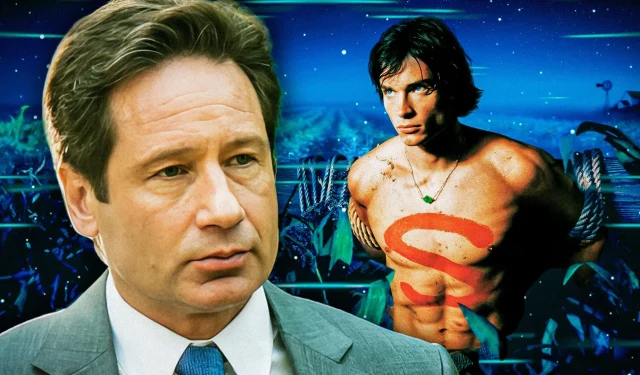Selecting a new TV show to watch can feel like an exercise in indecision, especially with the plethora of fascinating series available, many boasting impressive episode counts. However, those shows that keep viewers glued to their screens can become immersive experiences that seem to fly by. While miniseries that can be consumed in a single sitting have their charm, numerous iconic series have been able to nurture their characters and narratives over multiple seasons—a format that has proven successful in the streaming age.
Long-running series often build a dedicated fan base over the years, celebrating their rich storytelling and character development. Although contemporary TV often emphasizes fast-paced plots, extensive shows provide deeper insights into supporting characters’ arcs and allow for enjoyable filler episodes, which help enrich the overall universe of the series. For audiences ready to dive into an exceptional binge-worthy journey, the following shows showcase how storytelling can cultivate long-term viewer engagement.
1.
House (2004 – 2012)
8 Seasons / 177 Episodes
House masterfully intertwined captivating medical mysteries with the enthralling journey of a cynical anti-hero. Hugh Laurie delivered an unforgettable performance as the sharp-witted Dr. Gregory House, leading his diagnostic team through a labyrinth of strange ailments. This balance of episodic adventures and long-term character arcs made streaming several seasons of House a thrilling experience.
Despite House’s vast knowledge in diagnosing ailments, his struggles with personal relationships lent the show added depth and relatability.
2.
The X-Files (1993 – 2002, 2016 – 2018)
11 Seasons / 218 Episodes
The X-Files seamlessly intertwined episodic monster stories with an evolving mythology, establishing itself as one of the quintessential shows of the 1990s. During an era of 24-episode seasons, it provided ample opportunity for the narrative to develop and resonate with viewers. Centered around FBI agents Fox Mulder (David Duchovny) and Dana Scully (Gillian Anderson), their contrasting beliefs toward the supernatural deepened the intrigue of their investigations.
The X-Files cleverly drew inspiration from classic horror and science fiction, becoming a beloved franchise that includes movies and spin-offs. Although later seasons failed to replicate the show’s peak, its combination of suspense and engaging characters continues to captivate binge-watchers.
3.
Fringe (2008 – 2013)
5 Seasons / 100 Episodes
With an impressive array of 100 episodes, Fringe is often overlooked despite its engaging narrative that blends sci-fi procedural elements. The show ventured into themes like time travel and parallel universes, progressing toward season-long arcs and serialized storytelling that challenged the bounds of the speculative genre.
As it developed its mythology, Fringe drew viewers into a complex world of alternate realities and government conspiracies. John Noble’s portrayal of the brilliant yet flawed Walter Bishop added emotional weight to the series, complemented by a variety of memorable supporting characters. Fringe remains a modern classic waiting to be rediscovered by sci-fi enthusiasts.
4.
Smallville (2001 – 2011)
10 Seasons / 217 Episodes
Smallville’s depiction of the early years of Clark Kent, portrayed by Tom Welling, surprised audiences with its mix of action, teen drama, and long-form storytelling, managing to exceed 200 episodes. This unique approach to the iconic Superman narrative allowed viewers to witness Clark’s gradual discovery of his powers and destiny, alongside perfect casting such as Michael Rosenbaum as Lex Luthor.
This show, rooted in the pre-Marvel Cinematic Universe era, highlights Superman’s origins in a way that remains relevant today, making it a must-see for superhero fans seeking nostalgic yet captivating content.
5.
The Office (2005 – 2013)
9 Seasons / 201 Episodes
Finding its footing after a slow start, The Office transformed into a staple of binge-watching, filled with unforgettable moments—from the hysterical “Dinner Party” to the cringe-inducing “Scott’s Tots.” Winning five Primetime Emmy Awards, including Outstanding Comedy Series, it stands tall among the greatest sitcoms of all time.
6.
Gilmore Girls (2000 – 2007)
7 Seasons / 153 Episodes
Gilmore Girls emerged as a beloved series on The WB in the early 2000s, celebrated for its keen writing and vibrant characters. Following the lives of single mother Lorelai (Lauren Graham) and her daughter Rory (Alexis Bledel), the show captured the delicate balance of friendship and parental guidance.
Its relatable themes of low-stakes drama and blossoming romances made it easy to savor all 153 episodes, leading to a revival on Netflix with the miniseries Gilmore Girls: A Year in the Life in 2016.
7.
It’s Always Sunny In Philadelphia (2005 – Present)
16 Seasons / 170 Episodes
At a glance, committing to 16 seasons and 170 episodes of It’s Always Sunny In Philadelphia may seem daunting, but its dynamic storytelling makes it incredibly bingeable. The series revolves around a dysfunctional group running a bar, illustrated humorously through their chaotic interactions that often spiral hilariously out of control.
The addition of notable cast members like Danny DeVito further enriched the series, which thrived on the synergy between its creators and actors. As the longest-running live-action sitcom, It’s Always Sunny continues to entertain audiences.
8.
Buffy The Vampire Slayer (1997 – 2003)
7 Seasons / 144 Episodes
A pioneer in blending episodic and serialized narratives, Buffy the Vampire Slayer captivated audiences with its exploration of teenage life intertwined with supernatural elements. The show showcased female empowerment and self-awareness, all while delivering a blend of humor, horror, and heartfelt moments.
As viewers followed Buffy through her battles against formidable foes and personal relationships, the series maintained a compelling narrative arc that remains culturally relevant, making it an ideal binge-watch even today.
9.
Orange Is The New Black (2013 – 2019)
7 Seasons / 91 Episodes
While Orange Is The New Black initially focused on Piper Chapman’s journey through Litchfield Prison, its strength lay in its storytelling diversity. Offering insights into the lives of various inmates, the show switched perspectives to delve into their backstories, creating a rich tapestry of narratives that expanded upon the themes of crime, justice, and redemption.
10.
Lost (2004 – 2010)
6 Seasons / 121 Episodes
Lost excelled at captivating audiences with its deep-rooted mysteries and character exploration. Beginning with the crash of Oceanic Airlines Flight 815, the series cleverly unraveled its intricately connected storylines, leaving viewers eager for answers with each episode. With an ensemble cast, Lost utilized cliffhangers and shocking twists to keep audiences invested and eagerly speculating.
Despite some criticisms regarding its conclusion, Lost’s emphasis on character development and mystery established it as a significant part of television history and a highly bingeable experience.


